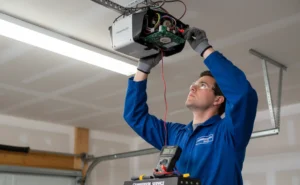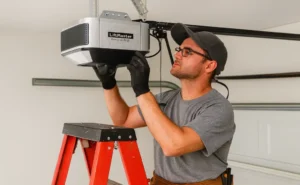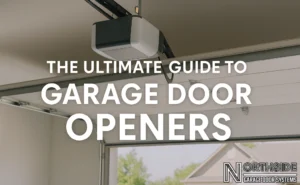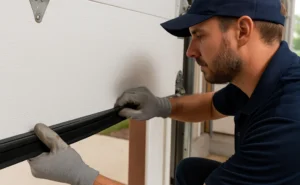You’re looking to install an insulated garage door, but you don’t know how much the cost of an insulated garage door? Then this article is for you.
Installing an insulated garage door in 2025 costs homeowners an average of $1,500, with most prices ranging from $1,100 to $4,200 depending on the size, material, insulation type (R-value), and design features. In some cases—especially for three-car or custom wood doors—costs can rise to $9,000 or more. Source: angi.com
Garage doors are a vital component of any home, offering a combination of security, energy efficiency, durability, and curb appeal. With modern advancements, homeowners now choose between insulated vs. non-insulated garage doors, and that decision significantly affects long-term comfort and utility bills.
Insulated garage doors include layers of insulating material designed to regulate internal temperature, reduce outside noise, and protect temperature-sensitive belongings. But are they worth the higher cost?
In this guide, we’ll learn about the true cost of insulated garage doors and do a comparative analysis of insulated vs. uninsulated doors. We’ll explore the factors that can affect the pricing of insulated garage doors and help you make an informed decision about which garage door is right for your home and budget.
Many factors influence the cost of insulated garage doors, and understanding them will help you make a more informed purchase. Below is a breakdown of the main elements that can raise or lower the final price.
1. Insulation Type & R-Value
The R-value measures how well the garage door resists heat flow—the higher the R-value, the better the insulation and the higher the cost.
- Polystyrene panels (R-value 6–9) are budget-friendly but provide moderate insulation.
- Polyurethane foam (R-value 12–18) offers superior insulation, is injected between layers, and costs more.
Expect to pay $400–$1,100 for basic insulated doors and $1,200–$2,700+ for high R-value models.
Pro Tip: If your garage is attached to your home or used as a workspace, aim for an R-value of at least 12 to maximize energy savings.

2. Material Comparison Table
Below we have shared a material comparison table to give you a good idea of the material costs. However, these prices may vary slightly based on location and time.
| Material | Average Cost Range | Insulation Quality |
| Steel | $650 – $3,200 | High |
| Aluminum | $600 – $2,900 | Medium |
| Fiberglass | $800 – $2,700 | Medium-High |
| Wood | $900 – $4,500 | Medium |
| Composite | $650 – $4,800 | High |
| Vinyl | $800 – $2,500 | Medium |
3. Size-Based Price Differences
Now we will learn about the cost of insulated garage doors based on size. The price of these may also vary slightly depending on time and location.
| Door Size | Average Cost Range |
| Single-car (8×7 ft) | $500 – $3,000 |
| Two-car (16×7 ft) | $800 – $5,000 |
| Oversized / Three-car | $1,400 – $7,200 |
Another thing to note is that Larger doors require more materials, insulation, and labor—meaning the cost of insulated garage doors increases significantly with size.
4. Installation Labor Cost
Professional installation typically costs $300 – $500 for standard setups and more for complex projects. Installation includes mounting the door, setting up the opener, balancing the springs, and ensuring the insulation is properly fitted.
- Adding an electric opener adds $220 – $520.
- Electrical wiring by a licensed electrician averages $50 – $100 per hour.
5. Optional Garage Door Insulated Add-ons
Homeowners often enhance insulated garage doors with extra features:
- Windows – $50 – $500 each (adds natural light)
- Smart locks or keypads – $200 – $500
- Security cameras & motion lights – $250 – $1,200
- Decorative hardware – $50 – $200
These upgrades can improve functionality and curb appeal but will increase the insulated garage door cost. Another thing to keep in mind in this case is that beyond these costs, the cost of installing a garage door opener is completely different. Another thing to know is that your installation costs will be much higher if you install a commercial fire-rated garage door.
6. Permit Fees & Removal Costs
Installing an insulated garage door involves a permit fee and a cost for removing the old door, which can vary based on certain factors.
- Permit fees: $40 – $120 (varies by city and state)
- Old door removal: $50 – $200 (often included in contractor pricing)
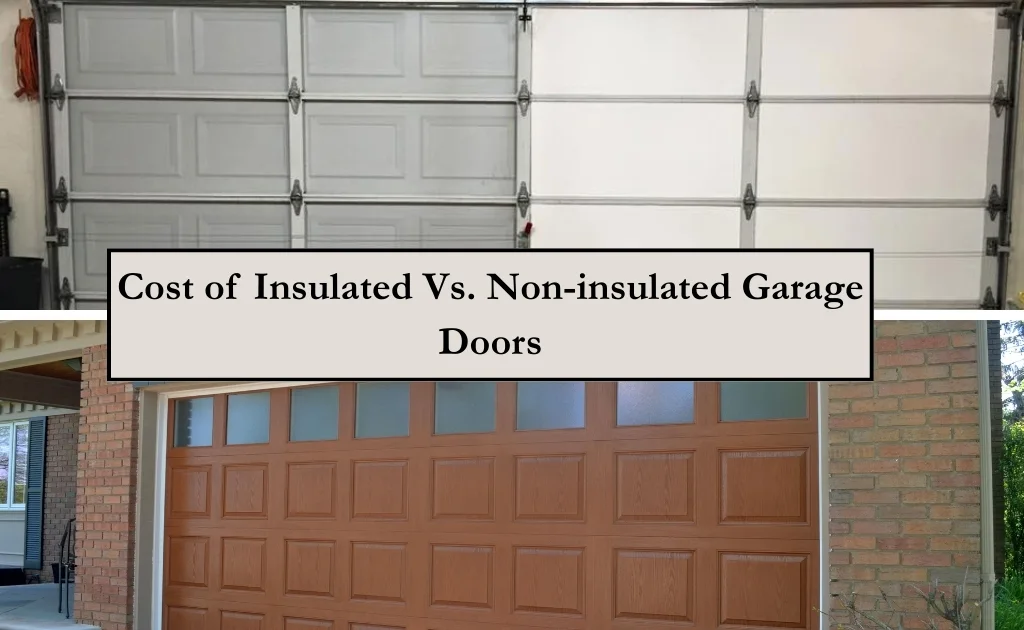
Cost of Insulated Garage Doors Vs. Non-insulated
Here are some general pricing guides for the different aspects of owning insulated garage doors vs. uninsulated garage doors.
Initial Purchase Price
Insulated garage doors typically range from $1,500 to $2,500 depending on size, material, and brand, while uninsulated garage doors generally cost between $1000 and $1,500.
Energy Savings
Insulated garage doors can reduce energy costs by maintaining a more stable temperature in the garage and adjacent rooms, leading to savings on heating and cooling bills. On the other hand, uninsulated garage doors do not provide the same level of energy efficiency, often resulting in higher energy costs, especially if the garage is attached to the house.
Durability & Maintenance
Insulated garage doors are often more robust due to the additional layers, requiring less frequent maintenance and repair. Uninsulated garage doors are more prone to dents, rust, and general wear and tear, potentially leading to higher maintenance costs over time.
Noise Reduction
Insulated garage doors offer better sound insulation, reducing noise from outside and within the garage. Uninsulated garage doors provide minimal noise reduction, which can be a drawback for garages near living spaces in closer environments.

Why Insulated Garage Doors are Worth It
We have highlighted some comparisons below as to why an insulated garage door might be worth it to you; hopefully, you will find your answer by considering these points.
Energy Efficiency
Insulated garage doors help maintain a stable temperature, reducing the load on HVAC systems. This leads to lower energy bills, making them a cost-effective choice in the long run.
Improved Comfort
Insulated doors keep the garage warmer in winter and cooler in summer, enhancing overall home comfort, especially if the garage is used as a workspace or has living spaces above or beside it.
Durability
The added layers of insulation often mean these doors are more durable and resistant to dents, dings, and other damage, leading to fewer repairs and replacements.
Noise Reduction
They provide superior sound insulation, which is beneficial if your garage is attached to or near living areas, contributing to a quieter home environment.
Increased Home Value
Homes with insulated garage doors may appeal more to potential buyers, adding value and making the property easier to sell.
Frequently Asked Questions
Here are some answers to the most common questions that tend to come to mind from homeowners who are considering investing in insulated garage doors.
Are insulated garage doors worth it?
Yes, we certainly think so! Insulated garage doors are worth the investment for several reasons, namely those that we have already listed above. They provide energy savings by reducing heating and cooling costs, improve the comfort of your home, and often last longer than uninsulated doors due to their enhanced durability. Also, they offer noise reduction and can increase the overall value of your home, making them the smartest choice for many during the decision-making process.
Can an existing garage door be insulated?
Yes, an existing garage door can be insulated. There are DIY kits available that allow homeowners to add insulation to their current doors. These kits typically include materials like foam boards, reflective insulation, or fiberglass batt insulation.
However, it’s important to note that adding insulation to an existing door may not be as effective as purchasing a new insulated door designed with integrated insulation. We would always recommend hiring a professional company to perform the installation of a new insulated garage door for you, in order to ensure you are getting the best possible product experience.
Does the type of garage door affect the insulation?
Yes, the type of garage door significantly affects the insulation. Different materials and construction methods provide varying levels of insulation.
Steel doors with foam insulation, for example, generally offer superior thermal performance compared to wood doors, which may not be as effective at insulating unless specifically designed for that purpose. Sectional doors often have better insulation than single panel doors because they fit more tightly and reduce the risk of air leakage.
Do insulated garage doors add value to a home?
Yes, insulated garage doors can definitely add value to a home. They enhance energy efficiency, which is a desirable feature for many homebuyers. The improved durability and aesthetic appeal of insulated doors also contribute to increased home value.
In addition, the added comfort and noise reduction benefits all come together to make a property more attractive to potential buyers, which will likely lead to a higher resale price in a competitive market.
How many years does a garage door last?
The lifespan of a garage door can vary based on factors like the material, usage, and maintenance levels. On average, a well-maintained garage door can last anywhere between 15 to 30 years. Insulated garage doors, thanks to their enhanced durability, will often fall on the higher end of this range.
Regular maintenance such as lubricating moving parts and ensuring the door is balanced can extend the lifespan of any garage door, so these estimates are always very dependent on the kind of care and attention that the homeowner commits to giving over the years.
Conclusion
In conclusion, it is clear to see from the weighed-up evidence that, though higher, the cost of insulated garage door is something that homeowners should regard as worthwhile when it comes to setting their property up not just for the best contemporary living conditions, but also for the best possible value for future selling purposes.

